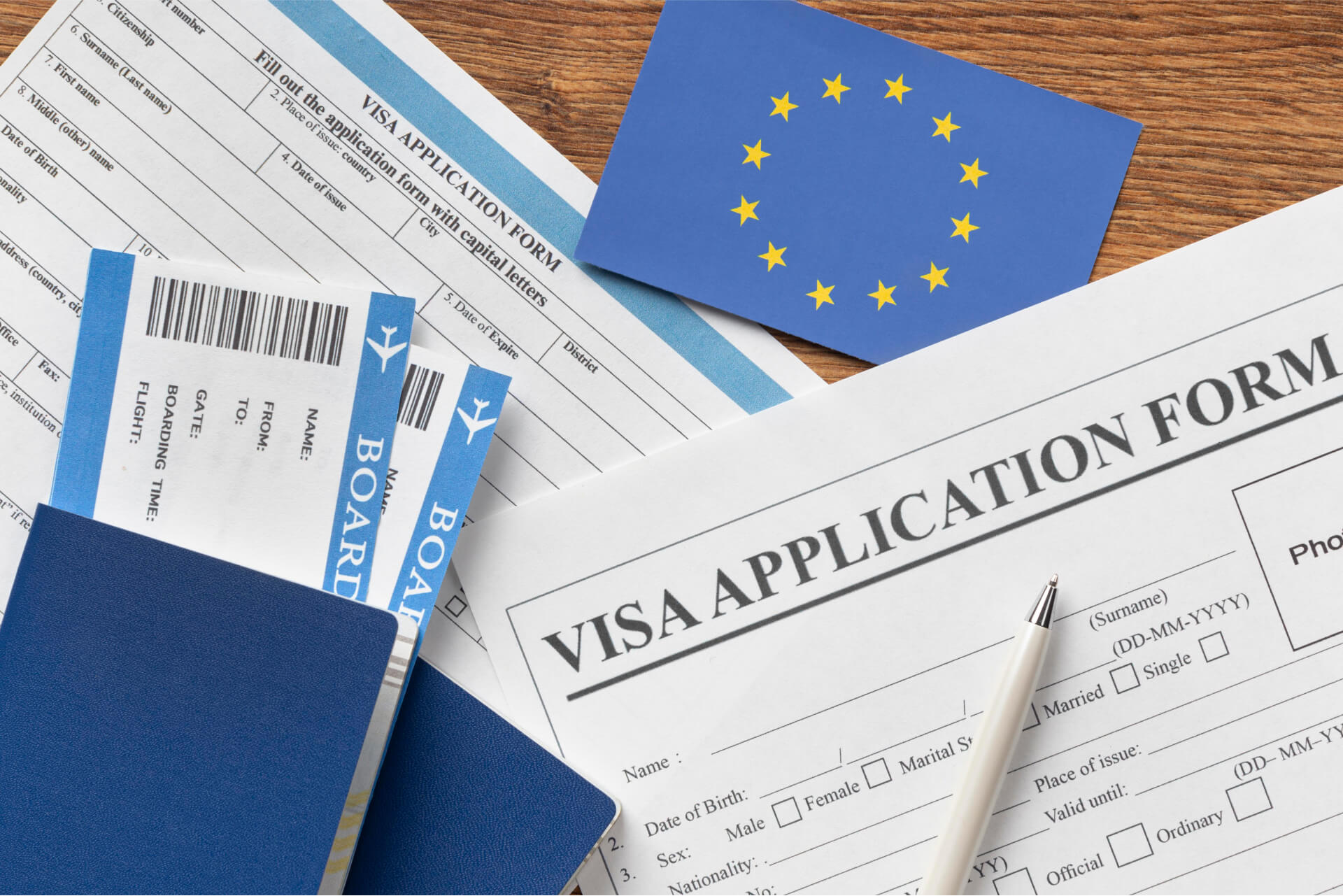How Soon Can I Apply for U.S. Citizenship After Green Card
Once you have your green card, you typically must live in the U.S. for a minimum of 5 years before applying for citizenship.
U.S. Citizenship Requirements for Green Card Holders
There are many paths to United States citizenship. The one most frequently used allows a green card holder to apply for naturalization (citizenship) after 5 years of permanent residence.
In most cases, if you are a United States lawful permanent or conditional resident (i.e. a green card holder), the general rule is that you can apply to naturalize (i.e. apply for U.S. citizenship) after you have lived in the United States as a lawful permanent resident for five years. It must be precisely 5 years to the date. You can check the date on your green card for the date that your residence was approved, then add five years to that date to see when you are eligible to apply. For instance, if you were approved for permanent residence on December 12, 2012, you could be eligible to apply for citizenship on December 12, 2017.
What difference between Citizen and Permanent Resident
In addition to having accumulated 5 years of permanent residency in the United States as a green card holder, there are some other requirements to be eligible to apply for naturalization:
- You must be 18-years of age or older when you file;
- Your 5 years of residency must immediately precede the date you file your Form N-400;
- Those 5 years must be continuous residence inside the United States;
- You must have lived in the same state or USCIS district that has jurisdiction over your place of residence for a minimum of 3 months prior to the date you file your application. If you are a student, you can apply for naturalization where you attend school or where your family resides- if you are still financially dependent on them;
- You must have been physically present in the U.S. for a minimum of 30 months out of the 5 years immediately preceding the date you file your application;
- You must live within the U.S. without interruption from the date you apply for naturalization through the date you become naturalized;
- You must be able to read, write, and speak English in addition to knowing some facts about U.S. history and civics; and
- You must demonstrate good moral character, a commitment to the principles of the U.S. Constitution, and an inclination toward the happiness and good order of the United States.
If you were given conditional residence through an investor visa or because you recently married a U.S. citizen, your 2 years as a conditional resident count toward your permanent residence if you successfully become a permanent resident when those 2 years have ended.

Exceptions to the 5-Year Rule for Citizenship
Some exceptions may apply, however, that may lessen the amount of time that you must wait before applying for U.S. citizenship. These exceptions include:
- The 90-Days Early Application Rule. This exception has to do with the amount of time it takes for USCIS to process your N-400. The whole process could take months- even if everything is running normally- so, the USCIS allows green card holders to submit their N-400 within the 90 days prior to the date of your 5-year anniversary. By the time your form has reached the USCIS via mail and someone has had time to review it and begin scheduling your biometrics appointment and so on, you will have undoubtedly reached your 5-year anniversary even sending your form in 90 days early.
- Exception for People Married to a U.S. Citizen. If you are a permanent or conditional resident married to – and living with- a U.S. citizen for the past 3 years, you may apply for your United States citizenship at the end of those 3 years. Even if you do not have a marriage-based green card, this rule may apply to you. For instance, if you came to the U.S. with an employment-based green card and married a U.S. citizen shortly after arriving, you may apply 3 years from the date of your marriage. You must, however, provide proof of the marriage and you must stay married to your spouse throughout your entire interview process- you cannot divorce, separate, or even move out without losing this exception.
- Exception for Battered Spouses of a U.S. Citizen. Because Congress doesn’t want immigrants to be forced to stay in an abusive marriage for 3 years just for the benefit of receiving the 3-year exception, the VAWA (Violence Against Women Act) was enacted. This provision, which applies equally to women and men, allows certain spouses and children of green card holders to self-petition without their abuser’s knowledge.
- Partial Exception to 5-Year Rule for Refugees. Thanks to a process called “rollback,” if you received your green card because you came to the U.S. as a refugee, a portion of the time you’ve spent as a refugee may count toward your time as a permanent resident. Starting with the date you came to the United States- if you were given refugee status while still in another country- all the years you lived in the U.S. before becoming a permanent resident can be counted.
- Partial Exception to 5-Year Rule for Asylees. If you received your green card because you were granted asylum status in the United States, one (1) year of your time as an asylee will be counted as if you were a permanent resident. This process is also called “rollback.” You may not, however, count any extra time if you waited longer than 1 year to apply for your green card after receiving asylum. You must wait 4 full years from the actual date that you were approved for your green card. To avoid confusion about when you can apply, note that USCIS will observe your rollback rights by backdating your permanent residence approval date on your card. Therefore, you must wait 5 full years from the date on your green card before applying for citizenship.
- Exception to 5-Year Rule for Spouses of U.S. Citizens in Certain Overseas Jobs. If your spouse has a job that requires you both to live abroad, you might be eligible to apply for U.S. citizenship before you have accumulated 5 years of permanent residence. You can file an application any time after being granted permanent residence, as long as you are willing to come back to the United States to apply. There are, however, several restrictions on who can use this exception. To even be considered, you must 1) be stationed overseas because of your spouse’s job on a regular basis, and 2) declare your intent to live in the U.S. when your spouse’s job ends. In addition to these 2 requirements, your spouse’s employer must be one of the following:
- The U.S. government, including the military, the American Red Cross, the Peace Corps, or the C.I.A.;
- Some type of U.S. attorney general-recognized U.S. research institution;
- A U.S. firm, corporation, or a subsidiary thereof, that is devoted entirely or in part to developing U.S. foreign trade and commerce;
- A public international organization that the U.S. participates in by treaty or statute; or
- A religious denomination that has an organization inside the U.S. Your spouse’s work there must be solely as a missionary, or some ministerial or priestly function.
Complete your immigration paperwork using our online software. We make it easy!
Complete your immigration paperwork using our online software. We make it easy!

However, there are some requirements that may force you to wait beyond the 5-year standard. If you have lived in the U.S. as a permanent lawful resident for 5 years, you could possibly have to wait even longer to apply for citizenship if:
You did not actually live in the United States for the required amount of time- for most green card holders, that time is a minimum of half of your required years as a permanent resident;
You have not resided at least 3 months in the state or district where you will be filing your application;
You spent more than a year outside the U.S., or
You cannot yet, for any reason, show that you’ve had upstanding moral character for the specified time before applying for citizenship.
Should I Renew my Green Card or Apply for U.S. Citizenship?
If you are a lawful permanent resident of the United States, you will have been given a photo identification card (your green card) that has an expiration date. The expiration date on your permanent green card will be 10 years from the day you were approved for permanent residence. Just prior to the card’s expiration, the green card holder is expected to apply for renewal.
If your green card will expire within the next 6 months, you might be wondering if you should renew it or apply for U.S. citizenship. There are some factors that will influence your decision. First, you must determine if you are eligible for citizenship. If you’ve been a green card holder for at least 5 years, maintained a residence in the U.S. for much of that time, and can demonstrate upstanding moral character, you may be eligible to apply for citizenship. And per any one of the exceptions listed above, some asylees, refugees, spouses of U.S. citizens, and some other immigrants may not have to wait 5 years before applying.
Before you decide whether to renew your green card or apply for citizenship, you should consider if you are prepared for all the responsibilities that come with being a U.S. citizen. As a green card holder, you have become accustomed to the rights to live, work, and travel freely inside the U.S. However, green card holders can’t vote or stay outside the U.S. for very long without risking abandonment of their residency. Green card holders also risk losing their residency rights if they do not inform USCIS about changes in their address, or if they participate in criminal activity or acts of terrorism or espionage. Additionally, because many federal programs enforce a 5-year waiting period on green card holders before they can receive benefits, green card holders may not always be eligible for the same assistance available to U.S. citizens.
As a U.S. citizen, however, you cannot be deported and a former immigrant can only have their citizenship revoked if they obtained it fraudulently in the first place. U.S. citizens are permitted to vote, run for elected office, and petition for more foreign national relatives to join them than a green card holder can.
If, however, you do not meet the qualifications for U.S. citizenship, or decide not to naturalize at this time, you will need to renew your green card. Your permanent residence does not expire when your green card does, but allowing your green card to expire could cause you problems, including loss of your rights to live, work, and travel freely within the United States. Most people will renew their green card by filing Form I-90 within 6 months of its date of expiration. However, different cases may have special circumstances. For instance, a conditional green card based on marriage to a U.S. citizen will require Form I-751 and a conditional green card based on a financial investment will require Form I-829.

How to Apply for U.S. Citizenship from Green Card
If you decide to apply for your U.S. citizenship, you must file Form N-400 through the USCIS. Once you have submitted your completed form, USCIS will check it for completeness and accuracy and will send you a receipt notice once they begin processing it. You will then be contacted about your naturalization interview and test. Most immigrants will be required to attend a biometrics appointment. In most cases, the interviewing USCIS officer will be able to tell you the results of your interview and test as soon as you have completed them. If you passed, the officer will give you information about your oath ceremony where you will pledge allegiance to the flag and become a United States citizen.
A successful application for U.S. citizenship requires passing the USCIS interview and citizenship test. To effectively interview and pass the test, you will need to have good English skills- reading, writing, and speaking. You will also need to have an understanding of some basic American government and history facts. All the information you will need to know can be found online. It might also be helpful to register for citizenship classes. There, not only will you learn the facts you need to pass the civics test, but you can also get some practice using conversational English, which will help you during your interview.
If you decide to apply for citizenship, the basic steps to Naturalization are as follows:
- Determine whether you are already a U.S. citizen. If you are not a citizen by birth, or did not acquire or derive citizenship from your parents automatically after your birth, proceed to step 2.
- Determine whether you are eligible to apply for citizenship. If so, proceed to step 3.
- Download and complete your Form N-400.
- Submit your completed N-400 along with the appropriate supporting documents. When you do, USCIS will send you a receipt notice.
- Attend your biometrics appointment, if necessary. USCIS will let you know the details of your appointment.
- Attend the citizenship interview at the time USCIS has scheduled for you. Bring your appointment notice with you.
- You will receive a written notice concerning the decision on your case. It will be 1 of 3 decisions: 1) Granted- you have been approved to naturalize, 2) Continued- your file was somehow incomplete or incorrect and USCIS will give you further instructions, or 3) Denied- USCIS will deny your application if it determines you are not eligible to naturalize.
- You will receive notice of your naturalization. If your naturalization was approved, you will be informed when to take part in a citizenship ceremony where you will take the Oath of Allegiance.
- Become a U.S. citizen by taking the Oath of Allegiance.

Applying for U.S. Citizenship with an Expired Green Card
What happens if you are in the process of applying for citizenship when your card expires? Your green card is just proof that you are a permanent resident, and even when the card expires, you are still a permanent resident of the U.S. For this reason, many people decide to apply for citizenship when their green card expires, or simply not bother to renew their card if they are waiting to hear from USCIS on a decision about their citizenship application. While USCIS policy fluctuates on their acceptance of this practice, on its own, lack of a current green card should not interfere with your naturalization approval.
In general, however, it is best to keep your green card renewed. Carrying a valid green card with you all the time is one of the responsibilities of being a permanent resident. And while several factors are involved in determining the timeline for citizenship approval, the process typically takes months. If you go for months without a valid green card, you could have trouble keeping your job, finding new work, or reentering the United states after traveling overseas. So, if you don’t want to renew your green card, play it safe and apply for citizenship more than 6 months before your green card will expire (but as soon as you are eligible).
*A Special Note About an Expired Conditional Green Cards*
An expired conditional resident card is an entirely different situation than the case discussed above. The expiration date on a conditional green card is also the expiration of your status. When your conditional green card expires, you must petition to have those conditions removed and convert your status to permanent resident. You will then need to accumulate more time as a permanent resident before applying for U.S. citizenship. The conditions placed on your conditional green card will dictate the form and process by which you may have those conditions removed.
When to Seek Help
If you have any questions or concerns about any legal incidents that could interfere with your application for green card renewal or your application for citizenship, you should contact an immigration attorney before proceeding with any of the processes discussed above.
Complete your immigration paperwork using our online software. We make it easy!
Complete your immigration paperwork using our online software. We make it easy!
Share this post
Read also
Be aware of any changes in US immigration policy
Our robot will always keep you posted on the Facebook

Usimmigrationforms.com is not a law firm. We do not provide legal advise or opinion to our customers. If you have a complicated case or need to receive a legal advise please consult with an experienced immigration attorney.
Immigration Advocacy Service
Immigration Advocacy Service
With our Attorney Application Review option, you can choose to have an experienced immigration attorney review your application and correct any mistakes.
With our Attorney Application Review option, you can choose to have an experienced immigration attorney review your application and correct any mistakes.
Popular services
Popular services
Category
Category
1
646-838-3958 info@usimmigrationforms.com
646-838-3958
info@usimmigrationforms.com
160 Broadway 4th floor New York NY 10038
160 Broadway 4th floor
New York NY 10038
Follow us
Follow us
Receive the latest news
Receive the latest news
TERMS AND CONDITIONS | PRIVACY U.S. immigration forms is not affiliated with the USCIS or any government agency. We are not a law firm, do not provide legal advice, and are not a substitute for the advice of an attorney. Customer support is for technical and billing issues only, and will not answer legal questions. Some forms that can be completed online using our service are available and come with written instructions for free from the USCIS. U.S. immigration forms purchase price does not include any government application, biometric or filing fees. Access to and use of the usimmigrationforms.com website, as well as all cancellation, termination or refund/return policies, are subject to U.S. immigration forms Terms of Use and Privacy Policy. The “U.S. immigration forms” mark and U.S. immigration forms logo are service marks registered with the United States Patent and Trademark Office under the laws of the United States of America.
0 Comments